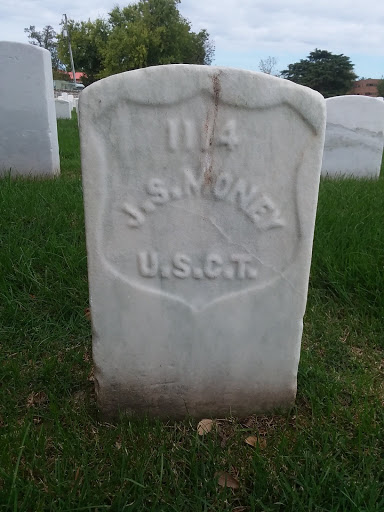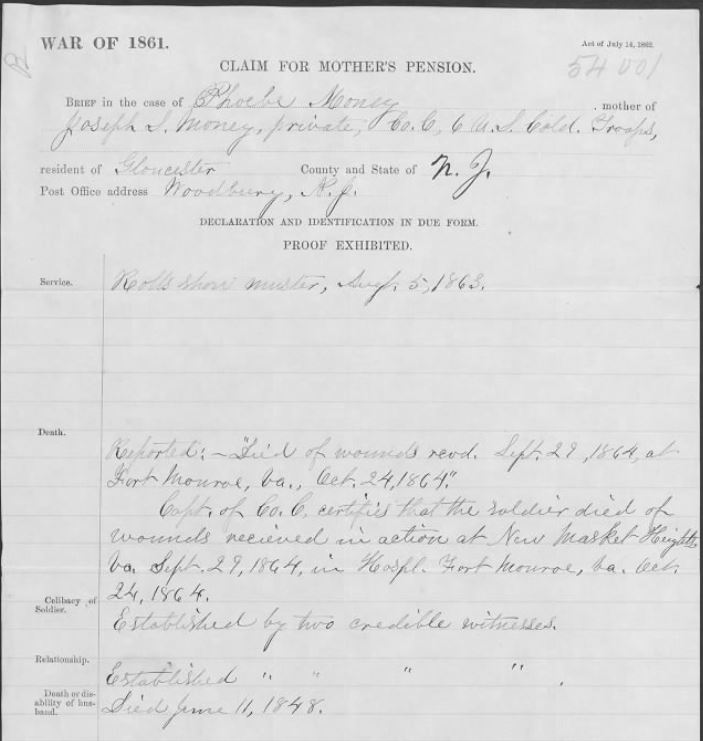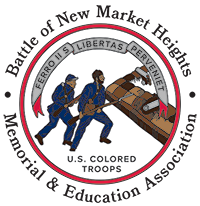
Conscripting (drafting) men for United States military service and the expanded enlistment of African Americans following the Emancipation Proclamation coincided in the spring of 1863. Black men of military age were just as subject to conscription as white men. At the time, drafted men could either pay a $300 commutation fee to get out of their service obligation, or they could provide a substitute. In most cases, the substitute charged the drafted man to serve in his place.
We do not know the motivation behind Joseph S. Money’s decision to serve as a substitute for a man named Henry Johnson. Unfortunately, due to Johnson’s common name, details into his life cannot be ascertained. Regardless, Joseph Money enlisted on August 5, 1863, at Frankford, a suburb northeast of Philadelphia. At 32-years old, Pvt. Money, born in Salem, New Jersey, was older than the average Civil War soldier. He was not a tall man, measuring just under 5’4”. The enlisting officer described Money’s complexion as “brown.”
Information on Money’s family and his pre-service life is unfortunately scarce. He does not appear in either the 1850 or 1860 census. Due to lack of information, this soldier’s story would be much shorter if Phoebe Money had not filed for a mother’s pension. In her pension application materials we get some better family details. Phoebe Money was born about 1805 or 1806. She shows up in both the 1850 and 1860 census, however without Joseph. In 1850, she lived in Deptford in Gloucester County, New Jersey, with three children ages 15, 13, and 4. By 1860, she lived in neighboring Woodbury, New Jersey, south of Philadelphia with son Ebenezer, who was the four year old in 1850. Phoebe worked as a washer woman.

In the pension application papers Phoebe Money stated that her husband, Anthony, passed away in 1848. Joseph Money would have been about 17 years old at that time. Perhaps Joseph lived and worked outside the family to be one less mouth Phoebe had to feed. In the pension records Phoebe also mentions that before enlisting Joseph worked in a livery stable earning $5 per week. She claimed that for ten years before the war Joseph gave her financial assistance to purchase “food, fuel, apparel, & paid house rent.” In addition, she reported that Joseph was not married and did not have children. By all appearances Joseph seems to have been a loving and dutiful son.
Pvt. Money’s service records indicate that was just as loyal to the 6thUnited States Colored Infantry as he was to his mother. He was present for duty on all of his record’s muster cards. He fought with the 6th at Petersburg on June 15, 1864, and worked “extra duty” on the Dutch Gap Canal project in August. On September 29, 1864, at the Battle of New Market Heights, Money stepped off with his comrades in Col. Samuel Duncan’s Brigade and stepped into history. Three of Money’s fellow 6th USCI soldier received the Medal of Honor for heroism; Lt. Nathan Edgerton, Sgt. Maj. Thomas R. Hawkins, and 1st Sgt. Alexander Kelly. Commander of the Army of the James, Maj. Gen. Benjamin Butler, commented in the days following the attack at New Market Heights: “The colored soldiers, by coolness, steadiness, and determined courage and dash, have silenced every cavil of the doubters of their soldierly capacity, and drawn tokens of admiration from their enemies.”
Among the scores of casualties that littered the battlefield, Pvt. Money writhed in pain with a gunshot wound to his left shoulder. Evacuated to Deep Bottom and transported by ship to the general hospital at Fort Monroe, he received treatment for his wound. Pvt. Money’s wound likely became infected and he died on October 24, just less than a month after the battle.
Surrounded now by fellow black and white United States soldiers, Pvt. Money’s grave number 1114 in Hampton National Cemetery peacefully witnesses the sun rise and fall each day. The days pass, the season’s change, and the years and decades continue to roll by. However, Pvt. Money is not forgotten. We thank you Pvt. Money for your decision to join the fight for the rights, liberty, equality, and justice deserved by all.

